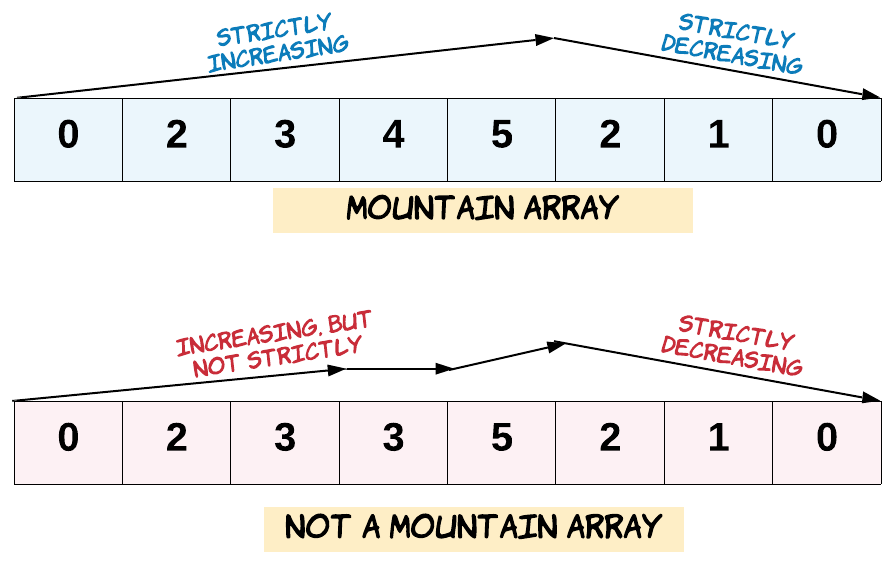Welcome to Subscribe On Youtube
941. Valid Mountain Array
Description
Given an array of integers arr, return true if and only if it is a valid mountain array.
Recall that arr is a mountain array if and only if:
arr.length >= 3- There exists some
iwith0 < i < arr.length - 1such that:arr[0] < arr[1] < ... < arr[i - 1] < arr[i]arr[i] > arr[i + 1] > ... > arr[arr.length - 1]

Example 1:
Input: arr = [2,1] Output: false
Example 2:
Input: arr = [3,5,5] Output: false
Example 3:
Input: arr = [0,3,2,1] Output: true
Constraints:
1 <= arr.length <= 1040 <= arr[i] <= 104
Solutions
-
class Solution { public boolean validMountainArray(int[] arr) { int n = arr.length; if (n < 3) { return false; } int l = 0, r = n - 1; while (l + 1 < n - 1 && arr[l] < arr[l + 1]) { ++l; } while (r - 1 > 0 && arr[r] < arr[r - 1]) { --r; } return l == r; } } -
class Solution { public: bool validMountainArray(vector<int>& arr) { int n = arr.size(); if (n < 3) return 0; int l = 0, r = n - 1; while (l + 1 < n - 1 && arr[l] < arr[l + 1]) ++l; while (r - 1 > 0 && arr[r] < arr[r - 1]) --r; return l == r; } }; -
class Solution: def validMountainArray(self, arr: List[int]) -> bool: n = len(arr) if n < 3: return False l, r = 0, n - 1 while l + 1 < n - 1 and arr[l] < arr[l + 1]: l += 1 while r - 1 > 0 and arr[r] < arr[r - 1]: r -= 1 return l == r -
func validMountainArray(arr []int) bool { n := len(arr) if n < 3 { return false } l, r := 0, n-1 for l+1 < n-1 && arr[l] < arr[l+1] { l++ } for r-1 > 0 && arr[r] < arr[r-1] { r-- } return l == r } -
function validMountainArray(arr: number[]): boolean { const n = arr.length; if (n < 3) { return false; } let [i, j] = [0, n - 1]; while (i + 1 < n - 1 && arr[i] < arr[i + 1]) { i++; } while (j - 1 > 0 && arr[j] < arr[j - 1]) { j--; } return i === j; }